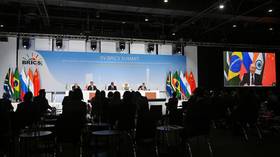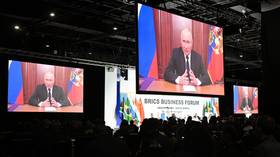BRICS reveals six new members

Argentina, Egypt, Ethiopia, Iran, Saudi Arabia, and the United Arab Emirates are joining the BRICS group of nations, after their candidacies were approved on Thursday by leaders of the current member states, South African President Cyril Ramaphosa has announced.
The six newcomers will become full-fledged members starting January 2024. The club currently consists of Brazil, Russia, India, China, and South Africa. BRICS expansion topped the agenda of the summit in Johannesburg this week.
“We value the interest of other countries in building a partnership with BRICS. We’ve tasked our foreign ministers to further develop the BRICS Partners Country model and a list of prospective partner countries,” the South African leader added.
BRICS previously expanded only once in 2010, when South Africa joined the organization. The admission was made without any prerequisites. One of the key goals of this year’s summit was to agree to more formal criteria for new candidates.
Russian President Vladimir Putin, whose nation will take the rotating BRICS presidency next year, thanked the host of the summit for his contribution to the outcome.
“President Ramaphosa has shown amazing diplomatic skill in reconciling all positions… regarding the expansion of BRICS,” he said.
The group touts itself as an alternative to Western-dominated international institutions, saying that its approach better reflects the emerging multipolar world. Member states have blamed the US and its allies for abusing their position during the moment of unipolarity, which they enjoyed following the collapse of the Soviet Union. As Western influence dwindled, its leaders leveraged tools under their control, such as the dollar, to protect its hegemonic position, BRICS members claim.
Participants of the summit expressed confidence that the organization’s influence will continue to grow. BRICS seeks to maintain a balanced approach to its admittance policy so that all parts of the world are represented and have an influence on its agenda.














